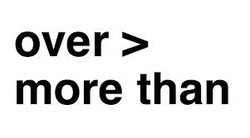
With those fewer than (or less than) 140 characters, the AP (Associated Press) waved its magic wand and changed the definition of a word. In this age of tweeting, seflies and twerking, I imagine it is OK (or okay?) for a news service, whose style book is the Bible for many news organiziations and businesses, to make that change for a good reason. So why did they do it?
As lexicographer Peter Sokolowski of Merriam-Webster tweeted:
"Under" can also mean "less than" in @APStylebook. 'Overwhelming evidence' is cited. 'it's futile to fight the tide.'"
It's futile to fight the tide? Gimme a break. The tide is what you fight when it comes to the English language. The English language arose in the Anglo-Saxon kingdoms of England and that was, well, a long time ago! The language has a long tradition and needs to remain clear in its words and the differcences among (yes among, not between) them.
I am not a grammarian nor an expert on language. I have been, for my entire adult life, since starting journalism school in the 1960s, a devotee of AP style. I have preached it everywhere I have worked, saying, in effect, it is the most acceptable of the "style books" out there, it isn't pretentious and you have to be consistent in writing -- so follow a stlyle so you can be consistent. And the AP style has universarlly been most accepted.
I know that dictionaries are adding words all the time, words that I don't necessary agree are real words. But the "less than/over" debate was over (not taller then, but done, finis) a long time ago. Then again, thanks to the AP, it's not more than, uh, over with yet.
Sokolowsi said there were audible gasps (can a gasp be inaudible?) when the change was announced.
Me too, more than that, i can say I won't get over than it.

 RSS Feed
RSS Feed